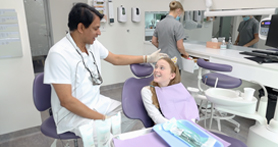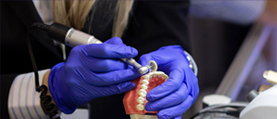Tooth extraction is the process of removal of one or more teeth from the jawbone when it is found to cause discomfort to the patient. The tooth is pulled out from the jawbone with the help of elevators and forceps. This is a simple tooth extraction.
For complex issues, the surgical method is used for extraction. The procedure can go wrong if the dentist is not skilled or if there are other underlying factors that can cause complications. Therefore, it is important to approach a skilled dentist for tooth extraction.
The biggest advantage of having your tooth pulled is that the other teeth are prevented from getting infected and thus most of the teeth are preserved while only a single tooth is pulled out.
It begins with the administration of local anaesthesia. It is administered in the gumline area near the tooth which is to be extracted. Then the tooth is made to loosen from its socket with the help of specialized dental tools. The tooth will be lifted gently. If the tooth has decayed or is broken, small incisions are made in the gumline for easier extraction.
Once the tooth is completely removed, the bone socket and the gumline area are disinfected with the help of an antiseptic solution. To prevent deterioration of the jawbone, bone grafting may also be performed. The procedure is completed here.
The dentist will then stitch the incision or the wound with sutures. A sterile gauze is fastened on this wound to stop bleeding and promote healing. Light bleeding is expected from the wound within the first 24 hours after the procedure, but the patient doesn’t need to get alarmed.
Some side effects of this procedure may occur within the first few days of the procedure. You may experience some swelling and pain in the area. Your dentist will prescribe medications to manage this. Gum soreness is also expected after the procedure. The patient is supposed to avoid eating hard or crunchy foods and beverages that may be too hot or cold. Foods like yogurt, porridge, soft fruits, etc. are advised for the patient as these are soft and nutritious and will promote faster healing.
Let us try to understand what complications can arise during a tooth extraction procedure.
Unsuccessful anaesthesia administration
Before beginning the tooth extraction procedure, the patient is administered local anaesthesia to prevent feeling any pain or discomfort. The patient, however, remains awake during the procedure.
When this anaesthesia does not provide numbing effect to the region of administration, that may indicate there is a fault in administration. This could be administration from odd angles, speed of injecting the solution, or administration of anaesthesia to the wrong location.
Also, it is possible to penetrate the tissue more than required to administer the aesthetic. In such cases, the anaesthesia should be given by the intravenous (IV) route. Intra ligamental route is also suggested if there is any issue with direct injection of the anaesthesia into the site of operation.
Medical conditions
Tooth extraction is a complex procedure. If the patient is experiencing any other dental or medical conditions, it could certainly affect the procedure. This is the primary reason why the patient is asked about their detailed medical history.
If the patient is suffering from a chronic disease, say diabetes, the dentist will have to maintain certain precautions during performing the treatment. A diabetic patient takes longer to heal from surgical procedures like tooth extraction as opposed to a healthy individual.
Certain medications are also avoided in such cases where the patient is suffering from a chronic disease. This is done to prevent adverse reactions and allergies.
Patient cooperation
During complex procedures like teeth extraction, patient cooperation is expected. If the patient cannot provide accurate information about the medical condition of the teeth, there is a possibility the procedure may go wrong.
If the dentist is properly informed about any chronic or other disorders of the mouth or the whole body, the dentist will maintain precautions and will perform the procedure with utmost care.
Tooth extraction may damage nearby teeth
During extraction, the dentist will apply a little pressure to remove the teeth from their bone socket, this may damage nearby teeth. Also, it is possible the dentist may remove the wrong tooth if there is no proper examination of the teeth. However, such cases are very rare.
What is more common, is damage to the teeth adjacent to the affected one. These teeth may become fractured or lost during extraction. The risk of such damage increases if proper equipment is not used.
Tooth loss
During extraction, the tooth may be cut into small pieces so extraction becomes easier. However, if any of the pieces are left behind in the mouth, it can cause harm to the patient.
The little pieces may get lost in the mouth or could be stuck under other teeth. This causes pain and discomfort to the patient as well as difficulty in chewing and speaking. The problem becomes severe when the patient accidentally swallows the tooth and the airways are blocked.
Tooth extraction may damage nerves
Nerves are the most sensitive part of the tooth. If these are damaged, the tooth slowly starts rotting. During a tooth extraction, it is possible to damage the nerve, if the tooth is pulled very harshly or with extreme force.
Injections intended for administering anaesthesia can also hurt delicate nerves. Gentle administration is performed by the dentist and the patient is already informed about this so the procedure does not come as shock and the patient remains calm, hence keeping the nervous system regulated and the nerves protected from shock this way.
Tooth extraction may cause trauma to the tissue
Gum tissue is very delicate and can be easily damaged if the procedure is not performed with care. Permanent and deep wounds are also possible if the incision is not stitched back properly. Also, if the patient is suffering from chronic disease, healing of the tissue becomes very difficult. It is also possible for the gum tissue to be ripped apart if the forceps are used harshly.
However, all of these issues can be avoided if you visit a skilled an experienced dentist for tooth extraction. So if you are suffering from toothache or any dental problem, don’t hesitate to get in touch with your nearest experienced dentist.




